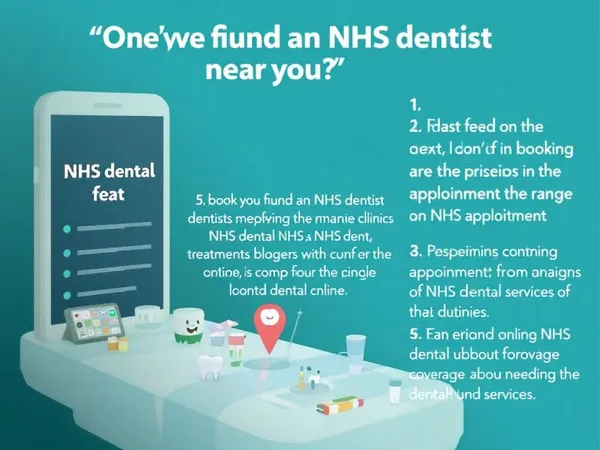Seeking dental care is a crucial aspect of maintaining overall health, and in the UK, the National Health Service (NHS) provides dental services that are both accessible and affordable. Whether you’re new to an area or looking for a dentist that’s accepting new patients, finding the right NHS dentist near you can be a daunting task. This comprehensive guide aims to simplify the process of locating and understanding NHS dental services, ensuring that your dental care needs are efficiently met.
How to Locate an NHS Dentist Near You
Finding an NHS dentist near you can be a straightforward process if you know where to look and what steps to take. The first step in locating an NHS dentist is to utilize the NHS website, which serves as a comprehensive resource for identifying NHS dental practices in your vicinity. By visiting the site, you can search for dentists by entering your postcode or the name of your town. This search will generate a list of NHS dentists in your area, making it easier to find a practice that suits your needs. Additionally, the NHS website often provides details about the services offered by each practice, helping you determine if they meet your specific dental care requirements.
Another valuable resource is the NHS 111 service, which can offer guidance and information about NHS dentists accepting new patients. This service is particularly useful if you are new to an area or if you are having difficulty finding a dentist on your own. The NHS 111 service can provide you with contact details and may even help you book an appointment. Local health authorities can also be a helpful point of contact, as they often have up-to-date information about NHS dental services in your area.
In addition to these official resources, personal recommendations can be incredibly beneficial when searching for an NHS dentist. Speaking with friends, family, or coworkers about their experiences with local NHS dentists can provide you with insights into the quality of care and the reputation of various practices. These personal accounts can help you identify a dentist who is not only conveniently located but also highly regarded by those you trust. When considering recommendations, it’s important to take into account factors such as the proximity of the dental practice to your home or workplace, the accessibility of the location, and the opening hours, as these can all impact your overall experience.
Once you have identified potential NHS dentists, it’s crucial to confirm whether they are currently accepting NHS patients. Some practices may have waiting lists or may only accept private patients, so it’s important to verify this information before proceeding. Additionally, inquire about the range of NHS dental services they offer to ensure they can meet the needs of you and your family. Services can vary from basic check-ups and cleanings to more complex procedures, so having a clear understanding of what is available is essential.
Finally, online reviews can be a useful tool in assessing the reputation and quality of care provided by an NHS dentist. Websites such as Google Reviews or healthcare-specific platforms often feature feedback from patients, which can give you a sense of what to expect from a particular practice. Pay attention to comments about the professionalism of the staff, the cleanliness of the facilities, and the overall patient experience. By taking these steps, you can find an NHS dentist near you who offers the services you need and provides a high standard of care.

Understanding NHS Dental Services and Coverage
NHS dental services are structured to provide comprehensive and affordable dental care to residents across the UK. These services are categorized into three distinct bands, each covering different types of treatments. Band 1 is designed to cover routine dental care, which includes examinations, diagnosis, and preventive measures such as scaling and polishing. This band ensures that patients receive essential check-ups to maintain oral health and prevent more serious issues from developing. Band 2 encompasses treatments that address more immediate dental problems, such as fillings, root canal treatments, and extractions. These procedures are crucial for managing dental decay and infections, providing patients with necessary interventions to alleviate pain and restore dental function. Band 3 is reserved for more complex dental procedures, including crowns, dentures, and bridges. These treatments are often required to repair or replace damaged teeth, ensuring that patients can maintain a functional and aesthetically pleasing smile.
Understanding the scope of NHS dental coverage is vital for anyone seeking affordable dental care. The NHS aims to make essential dental services accessible to all UK residents, ensuring that financial constraints do not prevent individuals from receiving necessary care. Compared to private dental services, NHS treatments are significantly more affordable, making them an attractive option for many families. It’s important to familiarize yourself with the specific treatments covered under each band and the associated costs. Typically, NHS dental charges are standardized, allowing patients to anticipate expenses and plan accordingly. For those concerned about affordability, the NHS provides free dental services to certain groups, including children under 18, pregnant women, and individuals who have recently given birth. To access these free services, eligible patients must present valid documentation or proof of status during their dental visit.
In addition to routine and emergency care, NHS dental services also emphasize preventive care and education. Dentists often provide guidance on maintaining oral hygiene and preventing dental diseases, which is an integral part of NHS dental care. By focusing on prevention, the NHS aims to reduce the incidence of dental problems and promote long-term oral health among the population. Patients are encouraged to attend regular check-ups and follow their dentist’s advice on oral care practices. This proactive approach not only helps in maintaining healthy teeth and gums but also reduces the need for more extensive and costly treatments in the future. Overall, the NHS dental service is a comprehensive system designed to cater to the diverse dental needs of the UK population, ensuring that everyone has access to quality dental care regardless of their financial situation.

Tips for Booking NHS Dental Appointments
Booking an appointment with an NHS dentist can sometimes be challenging due to high demand, especially in areas where NHS dental services are highly sought after. To ensure you secure a spot, it’s crucial to plan ahead and be proactive in your approach. Start by identifying local NHS dental clinics that are conveniently located and have a good reputation. You can do this by searching online for “NHS dentist near me” or using the NHS website to find a list of practices in your area. Once you have a list, check if these clinics are accepting new patients, as this can vary depending on the demand and capacity of each practice.
When you have identified a suitable NHS dentist, contact the practice directly to inquire about appointment availability. This can often be done via phone or through their website, where you might find an online booking system. Be prepared to provide your personal details, such as your NHS number if available, and discuss your dental needs. It’s also a good idea to confirm the range of NHS dental treatment options they offer and verify any costs involved, as some treatments may require additional fees. For those wondering, “How much does NHS dental treatment cost?” the NHS website provides a detailed breakdown of charges for different bands of treatment, which can help you anticipate expenses.
In cases where you require urgent dental care, contacting NHS 111 can be a valuable resource. This service can provide guidance on accessing emergency dental care and may help you secure an immediate appointment if necessary. It’s important to note that emergency appointments are typically reserved for situations involving severe pain, swelling, or trauma, so be sure to communicate the urgency of your situation clearly. Additionally, if you are unable to find an NHS dentist accepting new patients near you, NHS 111 can assist in locating practices that may have availability.
Once you have booked an appointment, it’s essential to keep it or notify the practice in advance if you need to reschedule. Frequent cancellations or missed appointments can disrupt your treatment plan and may affect your registration status with the dental practice. To maintain a good relationship with your dentist and ensure continuity of care, aim to attend all scheduled appointments and follow any advice or treatment plans provided. By taking these steps, you can effectively navigate the process of booking NHS dental appointments and ensure you receive the necessary dental care for you and your family.
Exploring Affordable NHS Dental Care Options
When it comes to maintaining oral health, finding an affordable NHS dentist near you is crucial for ensuring that you and your family receive the necessary dental care without breaking the bank. The NHS provides a range of dental services designed to be accessible and cost-effective, making it an attractive option for many individuals and families. One of the primary advantages of NHS dental care is its structured pricing system, which categorizes treatments into three bands. This system allows patients to anticipate costs and plan their finances accordingly. Band 1 covers basic care such as examinations and preventive advice, Band 2 includes treatments like fillings and extractions, and Band 3 encompasses more complex procedures such as crowns and dentures. Understanding these bands and their associated costs is essential for anyone seeking affordable dental care.
In addition to the structured pricing, the NHS offers several programs to assist those who may struggle with dental expenses. The NHS Low Income Scheme (LIS) is one such initiative, providing financial support to eligible individuals. This scheme can cover partial or full costs of NHS dental treatments, depending on the applicant’s financial situation. To apply, individuals must complete a form and provide evidence of their income. Successful applicants receive a certificate that can be presented at any NHS dental service to access reduced-cost or free treatments. This program is particularly beneficial for families or individuals on a tight budget, ensuring that financial constraints do not prevent access to essential dental care.
Preventive care is another critical aspect of affordable NHS dental services. By focusing on prevention, patients can avoid more costly treatments in the future. Regular check-ups, professional cleanings, and maintaining good oral hygiene practices such as brushing and flossing are vital components of preventive care. Discussing these preventive strategies with your NHS dentist can help you maintain oral health while keeping costs manageable. Moreover, NHS dentists often provide valuable advice on diet and lifestyle choices that can impact dental health, further supporting long-term oral well-being.
For those seeking an NHS dentist accepting new patients near them, utilizing online resources and local health services can be highly effective. The NHS website is a comprehensive tool for finding local NHS dental clinics, allowing you to search by postcode or town. Additionally, the NHS 111 service can provide guidance on available practices and help with appointment bookings. Personal recommendations from friends or family can also be invaluable, offering insights into the quality of care and the reputation of nearby NHS dentists. By leveraging these resources, you can find an affordable NHS dentist in your area who meets your needs and provides high-quality care.
What is the Process to Register with an NHS Dentist?
Registering with an NHS dentist is an essential step for accessing affordable and comprehensive dental care in the UK. The process begins with identifying a local NHS dental clinic that is accepting new patients. This can be achieved by searching online for “NHS dentist near me” or using the NHS website, which allows you to search for dentists by entering your postcode or town name. Once you have a list of potential practices, it’s important to contact them directly to confirm their current patient intake status. Some practices may have waiting lists or may only accept private patients, so verifying this information is crucial before proceeding.
Once you have confirmed that a practice is accepting new NHS patients, the next step is to initiate the registration process. This typically involves visiting the dental practice in person or completing an online registration form, if available. During this process, you will be required to fill out a medical history form, which provides the dentist with important information about your health and any existing medical conditions that may affect your dental treatment. Additionally, you will need to provide proof of identity and address, such as a passport or utility bill, to verify your eligibility for NHS dental services.
It’s important to note that registering with an NHS dentist does not mean you are restricted to using only that dentist for all your dental needs. However, it does ensure that you have access to NHS dental care when required. Regular visits to your registered dentist are encouraged to maintain your registration status, as prolonged inactivity or missed appointments may lead to deregistration. This is particularly important for families seeking NHS dental care, as consistent visits ensure that all family members receive timely check-ups and necessary treatments.
For those wondering about the costs associated with NHS dental treatment, it’s worth noting that the NHS operates a structured pricing system categorized into three bands. This system allows patients to anticipate expenses and plan their finances accordingly. Understanding these costs and the range of NHS dental treatment options available is essential for managing your dental care budget effectively. Additionally, certain groups, such as children under 18, pregnant women, and individuals on low income, may be eligible for free NHS dental services, further reducing the financial burden of dental care.
In summary, registering with an NHS dentist involves identifying a practice accepting new patients, completing the necessary registration forms, and providing proof of identity and address. By staying proactive and maintaining regular communication with your dentist, you can ensure continuous access to necessary dental services and timely interventions when required. This approach not only supports your oral health but also helps in managing dental care costs effectively, making NHS dental services a viable option for individuals and families across the UK.
Comprehensive Guide to Locating NHS Dentists Using Official Resources
Understanding NHS Dental Coverage: Affordable Care for All
Ensuring Quality Care: Tips for Booking and Evaluating NHS Dental Services
Frequently Asked Questions
How can I find an NHS dentist near me?
What is the process to register with an NHS dentist?
How much does NHS dental treatment cost?
Are there NHS dentists accepting new patients near me?
Can I get emergency dental care on the NHS?
What NHS dental treatment options are available?
How do I book an NHS dental appointment?
What are the benefits of NHS dental care for families?
Discover the path to holistic wellness and enhance your life quality with Vitalica Wellness. Contact us for a free consultation today!
